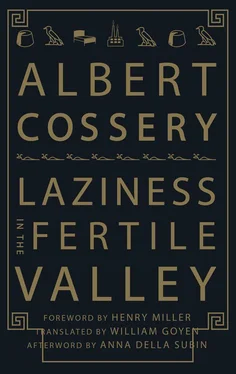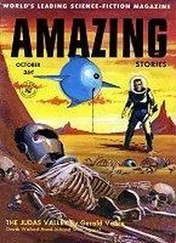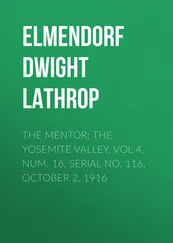Albert Cossery - Laziness in the Fertile Valley
Здесь есть возможность читать онлайн «Albert Cossery - Laziness in the Fertile Valley» весь текст электронной книги совершенно бесплатно (целиком полную версию без сокращений). В некоторых случаях можно слушать аудио, скачать через торрент в формате fb2 и присутствует краткое содержание. Год выпуска: 2013, Издательство: New Directions Publishing Corporation, Жанр: Современная проза, на английском языке. Описание произведения, (предисловие) а так же отзывы посетителей доступны на портале библиотеки ЛибКат.
- Название:Laziness in the Fertile Valley
- Автор:
- Издательство:New Directions Publishing Corporation
- Жанр:
- Год:2013
- ISBN:нет данных
- Рейтинг книги:3 / 5. Голосов: 1
-
Избранное:Добавить в избранное
- Отзывы:
-
Ваша оценка:
- 60
- 1
- 2
- 3
- 4
- 5
Laziness in the Fertile Valley: краткое содержание, описание и аннотация
Предлагаем к чтению аннотацию, описание, краткое содержание или предисловие (зависит от того, что написал сам автор книги «Laziness in the Fertile Valley»). Если вы не нашли необходимую информацию о книге — напишите в комментариях, мы постараемся отыскать её.
Laziness in the Fertile Valley — читать онлайн бесплатно полную книгу (весь текст) целиком
Ниже представлен текст книги, разбитый по страницам. Система сохранения места последней прочитанной страницы, позволяет с удобством читать онлайн бесплатно книгу «Laziness in the Fertile Valley», без необходимости каждый раз заново искать на чём Вы остановились. Поставьте закладку, и сможете в любой момент перейти на страницу, на которой закончили чтение.
Интервал:
Закладка:
“Well, did you kill her?”
“Kill who?”
“Good heavens, have you forgotten? Weren’t you supposed to kill Haga Zohra? What a fool I was to count on you.”
“I haven’t forgotten a thing. Don’t do anything, I’ll kill her one day.”
“Where were you? Uncle Mustapha was worried about you. He was in here bothering me about it.”
Galal kept his eyes shut while he talked; he couldn’t bear the hard glare of the electric light. He seemed like a blind man, his hands twitching in the void.
“Turn off that light, I beg you!”
Rafik had finished undressing and tied his pajamas. He turned out the light and lay down on his bed. He seemed determined to sleep.
Galal’s voice rose in the darkness:
“Listen: Uncle Mustapha just gave me some wonderful news.”
“What news?” asked Rafik.
“It’s news of the greatest importance for all of us,” said Galal feverishly. “Father has a hernia.”
Rafik stirred, then leaned over the bed.
“You’re sure Uncle Mustapha wasn’t lying?”
“I don’t think so. He told me he’d seen it. The marriage won’t take place.”
“It’s a good thing,” said Rafik in a dreamy voice. “Is it big?”
“It seems that it’s enormous! We can relax.”
“Not entirely,” said Rafik. “I’ll still have to wait for Haga Zohra. She’s a damned good go-between. She could marry off a corpse.”
They slept with peace in their souls, thinking of their father’s hernia that had saved them from disaster.
X
Standing on the embankment, Serag inspected his surroundings and found himself at the same spot where he had seen the child hunting with a slingshot. He was certain he would soon appear again from behind the tall stalks of corn. The sycamore stood before him at the side of the path, and he heard birds twittering in its branches. The path wound across the corn field and the road was at the end, lost in vaporous distance. Serag trembled at the slightest noise, looking around with a lost air. He was sad because the child wasn’t there. In going out that morning to look at the unfinished factory, Serag had thought of him, telling himself he must wander around this neighborhood. He was disappointed not to see him. He had imagined the child would have to be there, waiting, and he was almost angry with him for this betrayal.
He looked around again, but saw no trace of the child. He didn’t know what to do now. The child’s absence was a bad sign. Fate was against him. He had intended to go to the city with him. He wanted to link himself to the child, and follow him to exciting adventures. But the child had deserted him; he traveled the roads alone, fearless. Serag thought he would never find him again. He felt a bitter nostalgia at the memory of their first meeting.
He was tired from having waited in vain for the child. He still had to go as far as the factory; his supreme hope lay there. He came down from the embankment and started across the fields.
It was almost summer now. It was a hot day and Serag was uncomfortable in his heavy sweater. He thought he would have to change his outfit if he kept up these visits. Perhaps he would even have to buy some dark glasses to protect his eyes from the sun. Nevertheless, this heat was better than the changeable winter weather. There was no chance of wind or rain. There were no more heavy, sullen clouds, bringing sadness and desolation. Serag felt the desire for adventure stronger than ever. New blood seemed to be moving in his veins. Life with his family had become unbearable. Ever since his father had decided to marry, a demon seemed to have come into the house. Rafik was up in arms; even Galal no longer slept as much as usual. It was really pitiful to see Galal so upset; he had become almost human. Serag suffered for him.
He routed these harassing thoughts and walked faster. This brightness all around opened unsuspected horizons. He imagined he was really going to work. It was a beautiful illusion and Serag smiled contentedly.
He reached the top of the little hill, puffing. Now he could see the factory; it looked the same as it had on his last visit — no change in its half finished walls — the same sad abandonment, the same hostile air. Serag saw a man crouched near a hut. In front of him was a little wood fire on which he was cooking his meal. Serag felt a ray of hope, but he quickly saw that the man was a caretaker and not a worker. He wondered for a moment if he should ask him about the factory. Then he would finally know why it wasn’t finished, and if it would ever be finished. The man should know. However, Serag hesitated about making the extra walk. He was still rather far from the man, and the way was uneven and full of obstacles. It was really a rather hazardous walk. But Serag dearly wanted to know what chance he had of working in the factory. This was his only hope of finding out. He gathered his courage, walked down the hill, and, gritting his teeth, began to cross the cluttered ground towards the walls of the factory.
He moved with difficulty among the piles of huge rocks that lay scattered in the sun. The ruts impeded his steps. It was even more dangerous than he’d imagined. Several times he almost fell. He seemed to be going down an endless road. Finally, he stopped. It was the first time he had ever seen a factory so close. He was frightened by these walls that seemed to conceal the desperate labour of men. He saw them grow before him as if to rebuff his sacrilegious presence.
Serag stepped over a pile of old iron and found himself standing in front of the man. He looked at him for a moment in silence.
“Hello!
The man raised his head and replied in an indifferent tone:
“Hello!”
He was cooking beans on his wood fire. He was very old, his clothes patched like a beggar’s rags. A long heavy stick was lying near him on the ground.
“Are you the caretaker?” asked Serag.
“Yes,” said the man. “What do you want?”
“Excuse me,” said Serag. “But I’d like to know why they don’t finish this factory.”
“Allah alone can say,” said the man. “I was told to stay here; that’s all I know.”
They didn’t speak for a moment. The man took no notice of anything but his beans. He turned them with a piece of iron like a spoon. Now and then he inhaled the aroma and closed his eyes in satisfaction. Serag watched him, irritated and impatient. He wouldn’t learn anything after all!
“Then you don’t know anything?”
“Why does it interest you?” asked the man. “Leave the factory alone!”
‘Oh well!” said Serag, “I thought I might be able to work here.”
“You’re looking for work?” asked the man.
He looked at Serag, perplexed, scrutinizing him from head to toe and shaking his head.
‘You don’t look like a workman,” he began. “An effendi like you doesn’t work in a factory.”
“That’s no reason,” said Serag. “I can work very well. I’ve already been here several times; I could do a lot of things.”
He was terribly tired. But he forced himself to assume an easy, friendly manner. He wanted the caretaker’s good opinion. He imagined that perhaps he could recommend him to the director of the factory.
“No, my son. It’s no work for you.”
The beans were cooked; the man took them off the fire. Before beginning to eat, he said politely:
“Help yourself.”
“Thank you,” said Serag. “I’m not hungry.”
He sat on a large rock, facing the man. The sun burned over the whole countryside; it was almost noon. Serag was hot and thirsty.
“Have you been here long?”
“A few months,” said the man. “But I won’t stay much longer. It’s hard work. I have to watch over these stones and piles of iron all the time. There are bandits who come to steal everything. And I’m responsible for it, you understand!”
Читать дальшеИнтервал:
Закладка:
Похожие книги на «Laziness in the Fertile Valley»
Представляем Вашему вниманию похожие книги на «Laziness in the Fertile Valley» списком для выбора. Мы отобрали схожую по названию и смыслу литературу в надежде предоставить читателям больше вариантов отыскать новые, интересные, ещё непрочитанные произведения.
Обсуждение, отзывы о книге «Laziness in the Fertile Valley» и просто собственные мнения читателей. Оставьте ваши комментарии, напишите, что Вы думаете о произведении, его смысле или главных героях. Укажите что конкретно понравилось, а что нет, и почему Вы так считаете.












